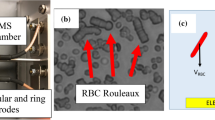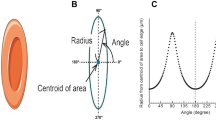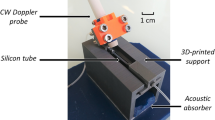Abstract
THE formation of bands of red cells in the blood vessels of live chick embryos during ultrasonication has been reported by Dyson, Woodward and Pond1. It was suggested that the segregation was primarily caused by Bernoulli forces between the cells owing to the displacement of the cells relative to the plasma, and that the standing wave was operative only in fixing the position of the segregation pattern. Here we suggest that it is primarily the standing wave which is the cause of the segregation.
This is a preview of subscription content, access via your institution
Access options
Subscribe to this journal
Receive 51 print issues and online access
$199.00 per year
only $3.90 per issue
Buy this article
- Purchase on Springer Link
- Instant access to full article PDF
Prices may be subject to local taxes which are calculated during checkout
Similar content being viewed by others
References
Dyson, M., Woodward, B., and Pond, J. B., Nature, 232, 572 (1971).
Hill, C. R., Physics Med. Biol., 15, 241 (1970).
Author information
Authors and Affiliations
Rights and permissions
About this article
Cite this article
BAKER, N. Segregation and Sedimentation of Red Blood Cells in Ultrasonic Standing Waves. Nature 239, 398–399 (1972). https://doi.org/10.1038/239398a0
Received:
Revised:
Issue Date:
DOI: https://doi.org/10.1038/239398a0
This article is cited by
-
In vivo acoustic and photoacoustic focusing of circulating cells
Scientific Reports (2016)
-
Spontaneous assembly of chemically encoded two-dimensional coacervate droplet arrays by acoustic wave patterning
Nature Communications (2016)
-
Real time observations of polylysine, dextran and polyethylene glycol induced mutual adhesion of erythrocytes held in suspension in an ultrasonic standing wave field
European Biophysics Journal (1987)
-
Electro-acoustic fusion of cells
Naturwissenschaften (1985)
Comments
By submitting a comment you agree to abide by our Terms and Community Guidelines. If you find something abusive or that does not comply with our terms or guidelines please flag it as inappropriate.



